许地山《落花生》翻译赏析(张培基译)
赏析《落花生》译文中对中国文化的传递

赏析《落花生》译文中对中国文化的传递作者:郑敏艳来源:《商情》2013年第43期许地山(1893—1941),现代作家、学者。
名赞堃,字地山,笔名落华生。
《落花生》是许地山先生的一篇久为流传的散文。
作者回忆自己童年时代的一个小小片段,以朴实无华,清新自然的笔调,从花生的平凡而有用,谈到做人的道理,富于哲理,反映他身处旧社会的污泥浊流而洁身自好,不慕虚荣的思想境界。
如果只读张培基先生的译作,甚至会以为是外国人写的文字,张培基先生的译作不仅体现出了他对中西两种文化、中西两种语言的透彻理解和娴熟驾驭。
更重要的是在宣扬中国文化方面做出了卓越贡献。
在他的译作中最为宝贵的是,非常注重传达具有中国文化特色的语句,他绝不为了迎合英语国家人士的口味而使文化失真。
选词精确且凝练,每个词语都经过仔细推敲,很好地传达了思想感情。
一、译文注重突出中国文化,真正做到文化传真茅盾先生曾说过“文学翻译不是单纯技术性的语言外形的变易”,而是“使译文既是纯粹的祖国语言,而又忠实正确地传达了原作内容和风格”(《在全国文学翻译工作会议上的报告》1954年8月),可见,翻译还需要与文化背景紧密结合,才能译出符合目的语文化习惯的表达效果。
因为,“语言文字既是民族社会化的产物,又是社会化的产物,同时又是社会文化信息的载体。
在这个意义上,语言文字是一种文化的信息符号系统。
民族的社会化,无不反映在这一符号系统中。
因此,语际转换不能忽视语言符号的这种文化信息承载——传递功能。
意义的转换必须包括语言文化信息所包含的尽可能完整的内容和特色。
否则,意义的语际转换必然是不完全的”。
朱光潜先生在《谈翻译》一文中说:“外国文学最难了解和翻译的第一是联想的意义……”“它带有特殊的情感氛围,甚深广而微妙,在字典中无从找出,对文学却极要紧。
如果我们不熟悉一国的人情风俗和文化历史背景,对于文字的这种意义就茫然,尤其是在翻译时这种字义最不易应付。
”张培基先生译文中具体例子如下:1.我们屋后有半亩隙地。
许地山《落花生》译文对比赏析翻译PPT

行文都是比较简 练准确的语言, 在这里刘所用的 eagerly显然要 比张所用的vied in giving the answer 要简明 得多,而且 eagerly显示出 孩子们的渴望热 切的心理,vie 有竞争的意识, 在这里用‚竞争‛ 一词就有点夸大 事实。
我们都争着答应:‚爱!” “谁能把花生的好处说出 来?”。
3.“可贵‛的翻译,‚good”意思比较广,不够准确; ‚beloved: loved very much”亦欠妥当,个人觉得可 以借用刘的句型,将good 改为valuable 。
这小小的豆不像那好看的苹 果、桃子、石榴,把它们的 果实悬在枝上,鲜红嫩绿的 颜色,令人一望而发生羡慕 之心。他只把果子埋在地底, 等到成熟,才容人把他挖出 来。
刘译:"Yes!" we all answered
eagerly. "But who can tell me what the peanut is good for?" 张译:“Yes, we do!” We vied in giving the answer. “Which of you could name the good things in peanuts?”
姊姊说:‚花生的气味很美。‛
哥哥说:‚花生可以制油。‛
刘译:"It is very delicious to
eat," my sister took the lead. "It is good for making cooking oil,” my brother followed. 张译:“Peanuts taste good,” said my elder sister. “Peanuts produce edible oil,” said my elder brother.
落花生译文赏析对比
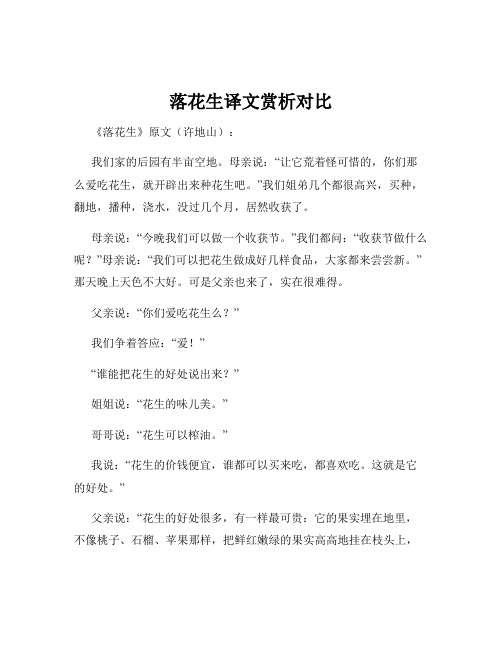
落花生译文赏析对比《落花生》原文(许地山):我们家的后园有半亩空地。
母亲说:“让它荒着怪可惜的,你们那么爱吃花生,就开辟出来种花生吧。
”我们姐弟几个都很高兴,买种,翻地,播种,浇水,没过几个月,居然收获了。
母亲说:“今晚我们可以做一个收获节。
”我们都问:“收获节做什么呢?”母亲说:“我们可以把花生做成好几样食品,大家都来尝尝新。
”那天晚上天色不大好。
可是父亲也来了,实在很难得。
父亲说:“你们爱吃花生么?”我们争着答应:“爱!”“谁能把花生的好处说出来?”姐姐说:“花生的味儿美。
”哥哥说:“花生可以榨油。
”我说:“花生的价钱便宜,谁都可以买来吃,都喜欢吃。
这就是它的好处。
”父亲说:“花生的好处很多,有一样最可贵:它的果实埋在地里,不像桃子、石榴、苹果那样,把鲜红嫩绿的果实高高地挂在枝头上,使人一见就生爱慕之心。
你们看它矮矮地长在地上,等到成熟了,也不能立刻分辨出来它有没有果实,必须挖起来才知道。
”我们都说是,母亲也点点头。
父亲接下去说:“所以你们要像花生,它虽然不好看,可是很有用。
”我说:“那么,人要做有用的人,不要做只讲体面,而对别人没有好处的人。
”父亲说:“对。
这是我对你们的希望。
”我们谈到深夜才散。
花生做的食品都吃完了,父亲的话却深深地印在我的心上。
以下是译文:我们家后院有半亩闲地。
老妈说:“就这么荒着多可惜呀,你们不是都特爱吃花生嘛,那就把这块地开垦出来种花生得了。
”我们兄弟姐妹几个一听可高兴了,买花生种子,翻地,种花生,浇水,没几个月呢,嘿,还真有收成了。
老妈说:“今晚上咱可以搞个收获节。
”我们就问:“收获节干啥呀?”老妈说:“咱能把花生做成好几种吃的,大家都来尝尝新鲜的。
”那天晚上天儿不咋好。
不过老爸也来了,这可不容易。
老爸就问:“你们喜不喜欢吃花生啊?”我们抢着回答:“喜欢!”“谁能说出花生的好处来?”姐姐说:“花生味道好。
”哥哥说:“花生能榨油呢。
”我讲:“花生价格便宜,谁都能买来吃,大家都爱吃。
许地山《落花生》翻译赏析
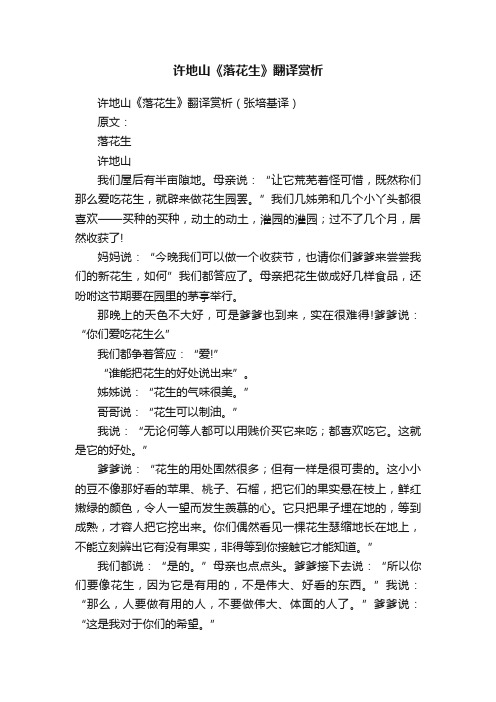
许地山《落花生》翻译赏析许地山《落花生》翻译赏析(张培基译)原文:落花生许地山我们屋后有半亩隙地。
母亲说:“让它荒芜着怪可惜,既然称们那么爱吃花生,就辟来做花生园罢。
”我们几姊弟和几个小丫头都很喜欢——买种的买种,动土的动土,灌园的灌园;过不了几个月,居然收获了!妈妈说:“今晚我们可以做一个收获节,也请你们爹爹来尝尝我们的新花生,如何”我们都答应了。
母亲把花生做成好几样食品,还吩咐这节期要在园里的茅亭举行。
那晚上的天色不大好,可是爹爹也到来,实在很难得!爹爹说:“你们爱吃花生么”我们都争着答应:“爱!”“谁能把花生的好处说出来”。
姊姊说:“花生的气味很美。
”哥哥说:“花生可以制油。
”我说:“无论何等人都可以用贱价买它来吃;都喜欢吃它。
这就是它的好处。
”爹爹说:“花生的用处固然很多;但有一样是很可贵的。
这小小的豆不像那好看的苹果、桃子、石榴,把它们的果实悬在枝上,鲜红嫩绿的颜色,令人一望而发生羡慕的心。
它只把果子埋在地的,等到成熟,才容人把它挖出来。
你们偶然看见一棵花生瑟缩地长在地上,不能立刻辨出它有没有果实,非得等到你接触它才能知道。
”我们都说:“是的。
”母亲也点点头。
爹爹接下去说:“所以你们要像花生,因为它是有用的,不是伟大、好看的东西。
”我说:“那么,人要做有用的人,不要做伟大、体面的人了。
”爹爹说:“这是我对于你们的希望。
”我们谈到夜阑才散,所有花生食品虽然没有了,然而父亲的话现在还印在我心版上。
译文:PeanutsBehind our house there lay half a mu of vacant land. Mother said, “It’s a pity to let it lie waste. Since you all like to eat peanuts so much, why not plant some here” That exhilarated us children and our servant girls as well, and soon we started buying seeds, ploughing the land and watering the plants. We gathered in a good harvest just after a couple of months!Mother said, “How about giving a party this evening to celebrate the harvest and inviting your Daddy to have a taste of our newly-harvested peanuts” We all agreed. Mother made quite a few varieties of goodies out of the peanuts, and told us that the party would be held in the thatched pavilion on the peanut plot.It looked like rain that evening, yet, to our great joy, father came nevertheless.Night sky is not very good, but the father has come, it is hard to come by.“Do you like peanuts” asked Father.“Yes, we do!” We vied in giving the answer.“Which of you could name the good things in peanuts” “Peanuts taste good,” said my elder sister.“Peanuts produce edible oil,” said my elder broth er.“Peanuts are so cheap,” said I, “that anyone can afford to eat them. Peanuts are everyone’s favorite. That’s why we call peanuts good.”“Peanuts are so cheap,” said I, “that anyone can afford to eat them. Peanuts are everyone’s favorite. That’s why we call peanuts good.”“It’s true that peanuts have many uses,” said Father, “but they’re most beloved in one respect. Unlike nice-looking apples, peaches and pomegranates, which hang their fruit on branches and win people’s instant admiration with their bril liant colours, tiny little peanuts bury themselves underground and remain unearthed until they’re ripe. When you come upon a peanut plant lying curled up on the ground, you can never immediately tell whether or not it bears any nuts until you touch them.”“That’s true,” we said in unison.Mother also nodded. “So you must take after peanuts,” Father continued, “because they’re useful though not great and nice-looking.”“Then you mean one should be useful rather than gre at and nice-looking,” I said.“That’s what I expect of you,” Father concluded.We kept chatting until the party broke up late at night. Today, though nothing is left of the goodies made of peanuts, Father’s words remain engraved in my mind.译文赏析:就原文而言,作者用朴实的语言记录了自己生活中的一个小故事,朴素、清新。
经典散文赏析—许地山《落花生》
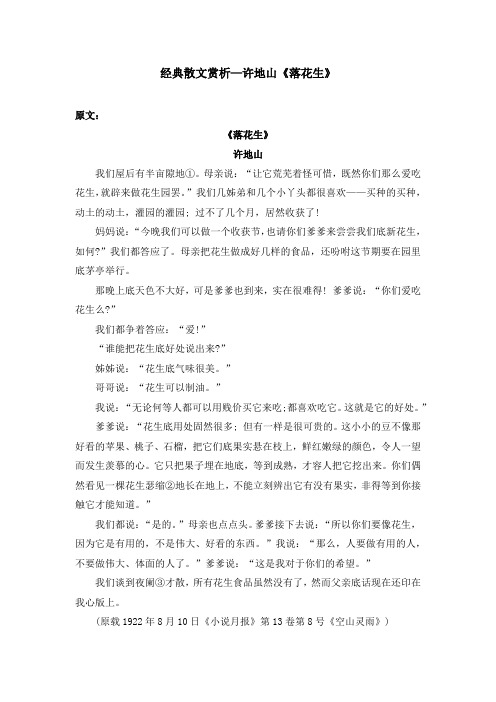
经典散文赏析—许地山《落花生》原文:《落花生》许地山我们屋后有半亩隙地①。
母亲说:“让它荒芜着怪可惜,既然你们那么爱吃花生,就辟来做花生园罢。
”我们几姊弟和几个小丫头都很喜欢——买种的买种,动土的动土,灌园的灌园; 过不了几个月,居然收获了!妈妈说:“今晚我们可以做一个收获节,也请你们爹爹来尝尝我们底新花生,如何?”我们都答应了。
母亲把花生做成好几样的食品,还吩咐这节期要在园里底茅亭举行。
那晚上底天色不大好,可是爹爹也到来,实在很难得! 爹爹说:“你们爱吃花生么?”我们都争着答应:“爱!”“谁能把花生底好处说出来?”姊姊说:“花生底气味很美。
”哥哥说:“花生可以制油。
”我说:“无论何等人都可以用贱价买它来吃;都喜欢吃它。
这就是它的好处。
”爹爹说:“花生底用处固然很多; 但有一样是很可贵的。
这小小的豆不像那好看的苹果、桃子、石榴,把它们底果实悬在枝上,鲜红嫩绿的颜色,令人一望而发生羡慕的心。
它只把果子埋在地底,等到成熟,才容人把它挖出来。
你们偶然看见一棵花生瑟缩②地长在地上,不能立刻辨出它有没有果实,非得等到你接触它才能知道。
”我们都说:“是的。
”母亲也点点头。
爹爹接下去说:“所以你们要像花生,因为它是有用的,不是伟大、好看的东西。
”我说:“那么,人要做有用的人,不要做伟大、体面的人了。
”爹爹说:“这是我对于你们的希望。
”我们谈到夜阑③才散,所有花生食品虽然没有了,然而父亲底话现在还印在我心版上。
(原载1922年8月10日《小说月报》第13卷第8号《空山灵雨》)赏析:《落花生》是老作家许地山1921年所写的一篇著名的回忆童年生活的散文。
这篇作品以平实清新的笔触,从花生的常见而有用,说到做人的道理,颇有哲理意味,寄寓着对现实人生的感触。
文章开头就说出屋后有“半亩隙地”,母亲觉得“让它荒芜着怪可惜”,便提议“辟来做花生园罢”。
姊弟们一听“都很喜欢”表示对这一提议的赞成和拥护。
接着作者只用“买种底买种,动土底动土,灌园底灌园”三个整齐的短句,形象、简洁的概括了种花生的全过程。
落花生张培基译文thepeanut
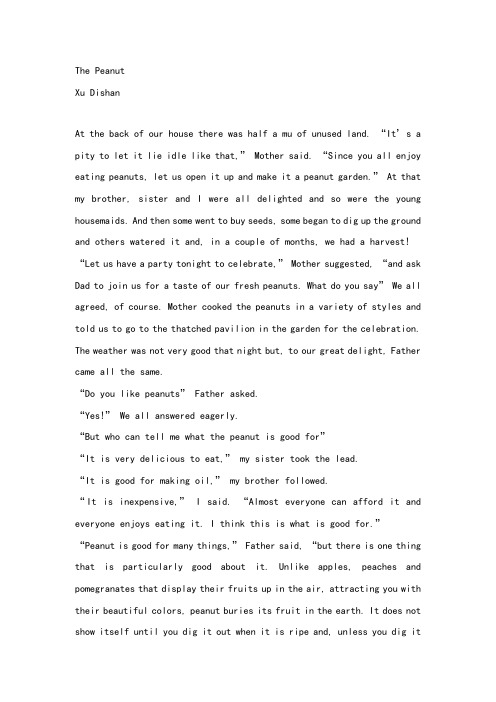
The PeanutXu DishanAt the back of our house there was half a mu of unused land. “It’s a pity to let it lie idle like that,” Mother said. “Since you all enjoy eating peanuts, let us open it up and make it a peanut garden.” At that my brother, sister and I were all delighted and so were the young housemaids. And then some went to buy seeds, some began to dig up the ground and others watered it and, in a couple of months, we had a harvest!“Let us have a party tonight to celebrate,” Mother suggested, “and a sk Dad to join us for a taste of our fresh peanuts. What do you say” We all agreed, of course. Mother cooked the peanuts in a variety of styles and told us to go to the thatched pavilion in the garden for the celebration. The weather was not very good that night but, to our great delight, Father came all the same.“Do you like peanuts” Father asked.“Yes!” We all answered eagerly.“But who can tell me what the peanut is good for”“It is very delicious to eat,” my sister took the lead.“It is good for making oil,” my brother followed.“It is inexpensive,” I said. “Almost everyone can afford it and everyone enjoys eating it. I think this is what is good for.”“Peanut is good for many things,” Father said, “but there is one thing that is particularly good about it. Unlike apples, peaches and pomegranates that display their fruits up in the air, attracting you with their beautiful colors, peanut buries its fruit in the earth. It does not show itself until you dig it out when it is ripe and, unless you dig itout, you can’t tell it bears fruit or not just by its frail stem quivering above ground.”“That’s true,” we all said and Mother nodded her assent, too. “So you should try to be like the peanut,” Father went on, “because it is useful, though not great or attrac tive.”“Do you mean,” I asked, “we should learn to be useful but not seek to be great or attractive”“Yes,” Father said. “This is what I expect of you.”We stayed up late that night, eating all the peanuts Mother had cooked for us. But father’s words remai ned vivid in my memory till this day.(刘世聪译)PeanutsXu DishanBehind our house there lay half a mou vacant land. Mother said: “It’s a pity to let it lie waste. Since you all like to eat peanuts so very much, why not plant some here” That exhilarated us children and our servant girls as well, and soon we started buying seeds, ploughing the land and watering the plants. We gathered in a good harvest just after a couple of months!Mother said, “How about giving a party this evening to celebrate the harvest and inviting your Daddy to have a taste of our newly-harvested peanuts” We all agreed. Mother made quite a few varieties of goodies out of the peanuts, and told us that the party would be held in the thatchedpavilion on the peanut plot.It looked like rain that evening, yet, to our great joy, father came nevertheless.”Do you like peanuts” asked father.“Yes, we do!”we vied in giving the answer.“Which of you could name the good things in peanuts”“Peanuts taste good,” said my elder sister.“Peanuts prod uce edible oil,” said my elder sister.“Peanuts are so cheap,” said I, “that anyone can afford to eat them. Peanuts are everyone’s favourite. That’s why we call peanuts good.”“It’s true that peanuts have many uses,” said father, “but they’re most beloved in one respect. Unlike nice-looking apples, peaches, and pomegranates, which hang their fruit on branches and win people’s admiration with their brilliant colours, tiny little peanuts bury themselves underground and remain unearthed until they’re ripe. Whe n you come upon a peanut plant lying curled up on the ground, you can never immediately tell whether or not it bears any nuts until you touch them.”“That’s true,” we said in unison. Mother also nodded. “So you must take after peanuts,” father continued, “because they’re useful though not great and nice-looking.”“Then you mean one should be useful rather than great and nice-looking,”I said.“That’s what I expect of you,” father concluded.We kept chatting until the party broke up late at night. Today, though nothing is left of the goodies made of peanuts, father’s words remain engraved in my mind.(张培基译)。
许地山《落花生》赏析
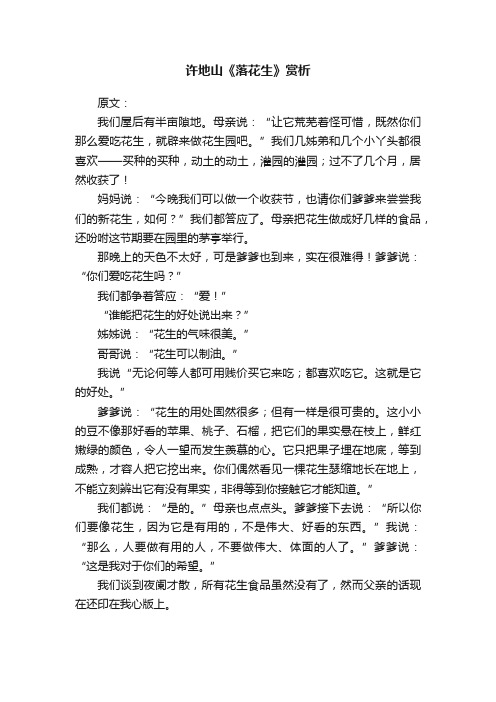
许地山《落花生》赏析原文:我们屋后有半亩隙地。
母亲说:“让它荒芜着怪可惜,既然你们那么爱吃花生,就辟来做花生园吧。
”我们几姊弟和几个小丫头都很喜欢——买种的买种,动土的动土,灌园的灌园;过不了几个月,居然收获了!妈妈说:“今晚我们可以做一个收获节,也请你们爹爹来尝尝我们的新花生,如何?”我们都答应了。
母亲把花生做成好几样的食品,还吩咐这节期要在园里的茅亭举行。
那晚上的天色不太好,可是爹爹也到来,实在很难得!爹爹说:“你们爱吃花生吗?”我们都争着答应:“爱!”“谁能把花生的好处说出来?”姊姊说:“花生的气味很美。
”哥哥说:“花生可以制油。
”我说“无论何等人都可用贱价买它来吃;都喜欢吃它。
这就是它的好处。
”爹爹说:“花生的用处固然很多;但有一样是很可贵的。
这小小的豆不像那好看的苹果、桃子、石榴,把它们的果实悬在枝上,鲜红嫩绿的颜色,令人一望而发生羡慕的心。
它只把果子埋在地底,等到成熟,才容人把它挖出来。
你们偶然看见一棵花生瑟缩地长在地上,不能立刻辨出它有没有果实,非得等到你接触它才能知道。
”我们都说:“是的。
”母亲也点点头。
爹爹接下去说:“所以你们要像花生,因为它是有用的,不是伟大、好看的东西。
”我说:“那么,人要做有用的人,不要做伟大、体面的人了。
”爹爹说:“这是我对于你们的希望。
”我们谈到夜阑才散,所有花生食品虽然没有了,然而父亲的话现在还印在我心版上。
赏析《落花生》全文由种花生、过收获节两部分组成,情感真挚,详略得当。
文章的重点部分是放在“过收获节"。
那天晚上,父亲也来了,于是哥、姐三人由花生的好处,譬如:“味美”、“能榨油"、“价格便宜"等特点进而深入到对于花生更深层次的领悟。
在父亲的循循善诱之下,作者逐渐感悟到落花生的价值。
它,不追求外表华美而重在实用,不是那种外表好看而对社会无用的东两,这便是全文的主旨。
《落花生》这篇文章,它每一段话,甚至每一个字,都包含着一个深刻的道理。
《落花生》两英译本的对比分析
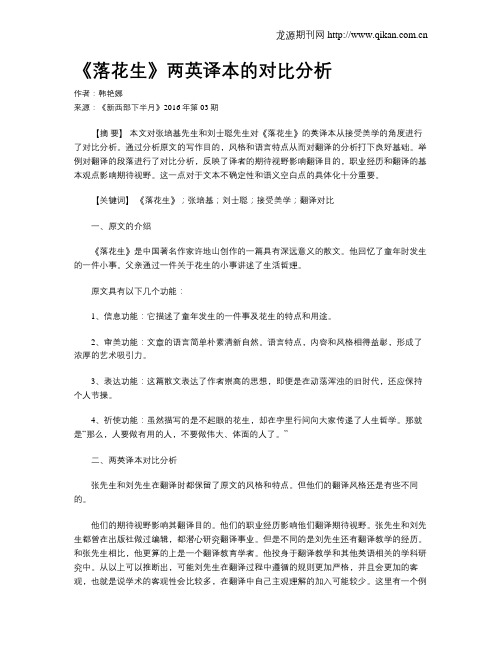
《落花生》两英译本的对比分析作者:韩艳娜来源:《新西部下半月》2016年第03期【摘要】本文对张培基先生和刘士聪先生对《落花生》的英译本从接受美学的角度进行了对比分析。
通过分析原文的写作目的,风格和语言特点从而对翻译的分析打下良好基础。
举例对翻译的段落进行了对比分析,反映了译者的期待视野影响翻译目的,职业经历和翻译的基本观点影响期待视野。
这一点对于文本不确定性和语义空白点的具体化十分重要。
【关键词】《落花生》;张培基;刘士聪;接受美学;翻译对比一、原文的介绍《落花生》是中国著名作家许地山创作的一篇具有深远意义的散文。
他回忆了童年时发生的一件小事。
父亲通过一件关于花生的小事讲述了生活哲理。
原文具有以下几个功能:1、信息功能:它描述了童年发生的一件事及花生的特点和用途。
2、审美功能:文章的语言简单朴素清新自然。
语言特点,内容和风格相得益彰,形成了浓厚的艺术吸引力。
3、表达功能:这篇散文表达了作者崇高的思想,即便是在动荡浑浊的旧时代,还应保持个人节操。
4、祈使功能:虽然描写的是不起眼的花生,却在字里行间向大家传递了人生哲学。
那就是“那么,人要做有用的人,不要做伟大、体面的人了。
”二、两英译本对比分析张先生和刘先生在翻译时都保留了原文的风格和特点。
但他们的翻译风格还是有些不同的。
他们的期待视野影响其翻译目的。
他们的职业经历影响他们翻译期待视野。
张先生和刘先生都曾在出版社做过编辑,都潜心研究翻译事业。
但是不同的是刘先生还有翻译教学的经历。
和张先生相比,他更算的上是一个翻译教育学者。
他投身于翻译教学和其他英语相关的学科研究中。
从以上可以推断出,可能刘先生在翻译过程中遵循的规则更加严格,并且会更加的客观,也就是说学术的客观性会比较多,在翻译中自己主观理解的加入可能较少。
这里有一个例子。
原文:“那晚上的天色不大好,…”刘先生译文:“The weather was not very good that nightbut,….”张先生译文:“It looked like rain that evening,….”而“天色不太好”并不代表就是要下雨了。
- 1、下载文档前请自行甄别文档内容的完整性,平台不提供额外的编辑、内容补充、找答案等附加服务。
- 2、"仅部分预览"的文档,不可在线预览部分如存在完整性等问题,可反馈申请退款(可完整预览的文档不适用该条件!)。
- 3、如文档侵犯您的权益,请联系客服反馈,我们会尽快为您处理(人工客服工作时间:9:00-18:30)。
许地山《落花生》翻译赏析(张培基译)原文:落花生许地山我们屋后有半亩隙地。
母亲说:“让它荒芜着怪可惜,既然称们那么爱吃花生,就辟来做花生园罢。
”我们几姊弟和几个小丫头都很喜欢——买种的买种,动土的动土,灌园的灌园;过不了几个月,居然收获了 !妈妈说:“今晚我们可以做一个收获节,也请你们爹爹来尝尝我们的新花生,如何?”我们都答应了。
母亲把花生做成好几样食品,还吩咐这节期要在园里的茅亭举行。
那晚上的天色不大好,可是爹爹也到来,实在很难得! 爹爹说:“你们爱吃花生么?”我们都争着答应:“爱!”“谁能把花生的好处说出来?”。
姊姊说:“花生的气味很美。
”哥哥说:“花生可以制油。
”我说:“无论何等人都可以用贱价买它来吃;都喜欢吃它。
这就是它的好处。
”爹爹说:“花生的用处固然很多;但有一样是很可贵的。
这小小的豆不像那好看的苹果、桃子、石榴,把它们的果实悬在枝上,鲜红嫩绿的颜色,令人一望而发生羡慕的心。
它只把果子埋在地的,等到成熟,才容人把它挖出来。
你们偶然看见一棵花生瑟缩地长在地上,不能立刻辨出它有没有果实,非得等到你接触它才能知道。
”我们都说:“是的。
”母亲也点点头。
爹爹接下去说:“所以你们要像花生,因为它是有用的,不是伟大、好看的东西。
”我说:“那么,人要做有用的人,不要做伟大、体面的人了。
”爹爹说:“这是我对于你们的希望。
”我们谈到夜阑才散,所有花生食品虽然没有了,然而父亲的话现在还印在我心版上。
译文:PeanutsBehind our house there lay half a mu of vacant land. Mother said,it lie“ It’ s a pity to let waste. Since you all like to eat peanuts so much, why not plant some here?” That exhilarated uschildren and our servant girls as well, and soon we started buying seeds, ploughing the land andwatering the plants. We gathered in a good harvest just after a couple of months!Mother said,“ How about giving a party this evening to celebrate the harvest and invitingyour Daddy to have a taste of our newly- harvested peanuts?” We all agreed. Mothermade quite afew varieties of goodies out of the peanuts, and told us that the party would be held in the thatchedpavilion on the peanut plot.It looked like rain that evening, yet, to our great joy, father came nevertheless.Night sky is not very good, but the father has come, it is hard to come by.“ Do you like peanuts?” asked Father.“ Yes, we do!” We vied in giving the answer.“ Which of you could name the good things in peanuts?”“ Peanuts taste good,”said my sister.“ Peanuts produce edible oil,”said my elder brother.“ Peanuts are so cheap,”“saidthatI,anyone can afford to eat them. Peanuts are everyone’ s favorite. That’ s why we call peanuts good.”“ Peanuts are so cheap,” said I,“ that anyone can afford to eat them. Peanuts are everyonefavorite. Tha t ’ s why we call peanuts good.”“ It’ s true that peanuts have many uses,” said Father,“ but they’ re most beloved in one resp Unlike nice-looking apples, peaches and pomegranates, which hang their fruit on branches andwin people’ s instant admiration with their brilliant colours, tiny littlepeanuts bury themselvesunderground and remain unearthed until they’ re ripe. When you come upon a peanut plant lyingcurled up on the ground, you can never immediately tell whether or not it bears any nuts until youtouch them.”“ That ’ s true,”we said in unison. Mother also nodded.“ So you must take after peanuts,”continued,“ because they’ re usefulnothoughgreat and nice-looking.”“ Then you mean one should be useful rather than great and nice- looking, ” I said.“ That ’ s what I expect of you,Father concluded”.We kept chatting until the party broke up late at night. Today, though nothing is left of thegoodies made of peanuts, Father’ s words remain engraved in my mind.译文赏析:就原文而言,作者用朴实的语言记录了自己生活中的一个小故事,朴素、清新。
而译文也同样用简单而地道的英语表达和原文在风格上保持了一致。
下面节选文中的片段对译文进行赏析,并提出一些个人认为需要改进之处给以建议。
选段一:我们屋后有半亩隙地。
母亲说:“让它荒芜着怪可惜,既然称们那么爱吃花生,就辟来做花生园罢。
”我们几姊弟和几个小丫头都很喜欢——买种的买种,动土的动土,灌园的灌园;过不了几个月,居然收获了!译文: Behind our house there lay half a mu of vacant land. Mother said,“It’s a pity to let it liewaste. Since you all like to eat peanuts so much, why not have them planted here. ”Thatexhilarated us children and our servant girls as well, and soon we started buying seeds, ploughingthe land and watering the plants. We gathered in a good harvest just after a couple of months!分析:优点:1.“屋后”从逻辑上讲应该是房子的“后面”,用“Behind”,较为准确,但有人将其译为“ At the back of ”则表示房间的“后部”。
2.“有一亩空地”用“ lay”更具动感,通常人们会将其译成there be 句型。
同时译文用 It ’s a pity to do sth符合英语表达习惯,且to let it lie waste 地道而朴实地表达出了原文的意思。
3.译文用 why not ⋯表示一种商量的语气,有的译文用let’s do sth 句式则没有这种商量的语气,且显得平淡。
4.译文将“我们姐弟几个”译为“us children”简洁精练,若译为 my brother, sisterand I 则显得比较冗长繁琐。
5.原文有破折号,但译文用and soon 来代替,准确的传达了原文的含义。
6.中文喜用排比,或者“有的⋯⋯有的⋯⋯”句式,但英文忌重复,故译者用 we ⋯代替 some ⋯some⋯ others 显然更加符合英文的表达习惯,虽然在表意的准确性上会有一点欠缺,但这样的取舍更易于译语受众理解。
7.译者在 started 之后用 buying, ploughing, watering 三个动词的 -ing 形式,突显出我们忙忙碌碌的景象。
8.翻译本段最后一句时,译文使用 we gathered in a good harvest just after 既简练又把“居然收获”的惊喜表达出来了。
不足:1.“爱吃花生”应该表达的是一种习惯,而like to eat 一般表示某次心血来潮的想法。
因此,建议用 like eating/ enjoy eating 。
2.译文用 servant girls 可能引起歧义,因servant girls 多用于表示丫环,但是“小丫头”未必就是丫环,可能是其他的小女孩。
建议删去servant girls 。
3.就“开辟出来种花生吧”一句,译文 have hem planted here. 显得过于简单。
从上下文来看,母亲应该是想很好的利用这块地来种花生。
建议改成why not makefull use of it and plant some peanuts?或为使译文更简洁更口语化,可直接改为why not plant some here?选段二:妈妈说:“今晚我们可以做一个收获节,也请你们爹爹来尝尝我们的新花生,如何 ?”我们都答应了。
